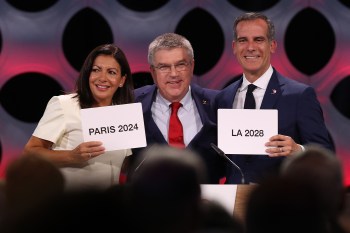Runner Nick Symmonds on the business of being an Olympian
Jeff Horwich: Nick Symmonds is one of the world’s fastest men — America’s top Olympic qualifier in the 800 meters. He’s also literally the poster-boy for athlete entrepreneurism: Symmonds auctioned off his left shoulder as a billboard. A Milwaukee ad agency paid $11,000 for the space on eBay. Nick Symmonds now sports the agency’s logo as a temporary tattoo.
But when Symmonds, his tattoo and his money-making message show up at the Olympics — that’s when things get messy. Nick Symmonds is at the games in London. Thanks for joining us.
Nick Symmonds: Thank you guys for having me.
Horwich: Why do you have to cover that sponsor’s tattoo when you’re on the track?
Symmonds: Yeah, well, the various governing bodies that control track and field and the Olympic Games — it’s IAAF for track and field events, and then the IOC, of course, for Olympic events — they want to protect the event sponsors, and they think that if athletes represent their individual sponsors in any way, it could lessen that investment by the event sponsors. So in my case, it would be Nike. I’m allowed to represent Nike on my uniform and my spikes, but anything other than that has to be covered up.
Horwich: In a general sense, what is that you want to be able to do — with your body, with your name — that you’re not able to do now?
Symmonds: Well really I think that the athletes are only able to attend these meetings with a lot of help from their partners and their sponsors throughout the years. I’ve had so many teammates that have been forced into early retirement simply because they couldn’t make ends meet, and I also know of thousands of companies — especially back in the States — that would love to invest in these athletes, but say to the athletes: “Gosh, I’d love to invest but I’d have to be able to get a return on my investment somehow. Is there any way you could display our corporate logo anywhere at any time?” And according to the IAAF, no there’s not.
I specifically like to view this sport as trying to run a business. I’ve incorporated — Nick Symmonds, LLC. You know, to run a business, I have to be able to give my partners a return on their investment.
Horwich: Since ancient Greece, the Olympics have been an “amateur sporting competition.” Is there nothing to be said for trying to hang on — and that’s seems like what the IOC’s trying to do here — trying to hang on to some pure vestige of that?
Symmonds: I don’t know if I’d necessarily say that’s what the IOC’s trying to do. If you have $6 billion exchanging hands, it just kind of blows my mind that you’ve got 10,000 athletes who have devoted at least four years of their life to becoming part of the show, and everybody is making money, but then they look at the athletes and say: “Oh, you guys should do your job for free.” I kind of don’t understand that.
Horwich: Financially, how different are the worlds that await you if you win, or at least place — and if you don’t?
Symmonds: Well, that’s really where the financial return comes for the athletes. And that’s kind of what we all are in it for– is that if you do manage to win an Olympic gold or even in some cases just medal, the income that will come following that is substantial.
But it should be more than that, I feel like. I would like to see a guaranteed salary for everyone who makes the Olympic team. If you were to take some of the TV rights — I think it was $1.7 billion in TV rights — and divide that up amongst the athletes, you know what I’m saying? I mean, we’ve got Olympians, Olympic medalists even, that live below the poverty line, and that’s not right.
Horwich: Well, Nick Symmonds — what do you say to a runner? Run like the wind? — but thanks for talking with us.
Symmonds: Thank you guys.
There’s a lot happening in the world. Through it all, Marketplace is here for you.
You rely on Marketplace to break down the world’s events and tell you how it affects you in a fact-based, approachable way. We rely on your financial support to keep making that possible.
Your donation today powers the independent journalism that you rely on. For just $5/month, you can help sustain Marketplace so we can keep reporting on the things that matter to you.


















